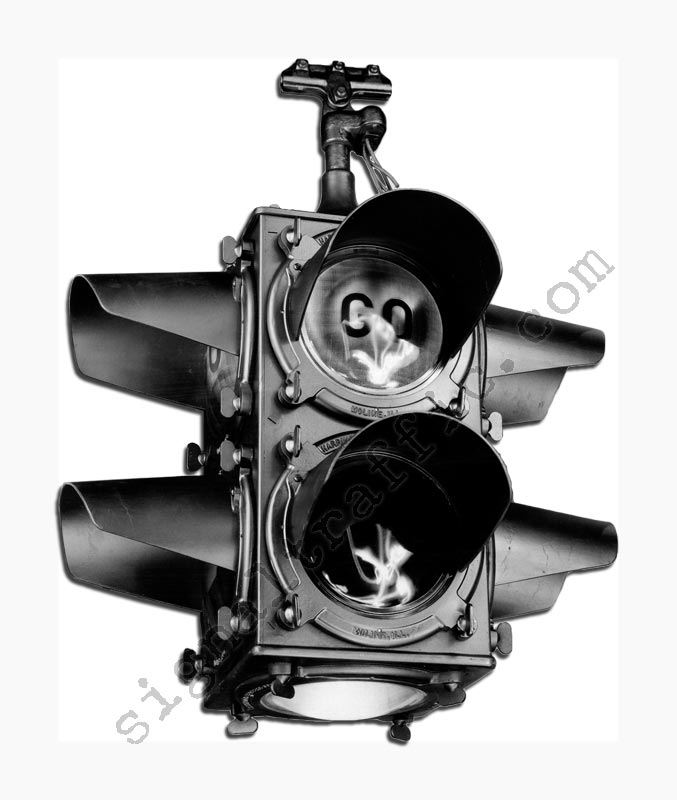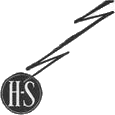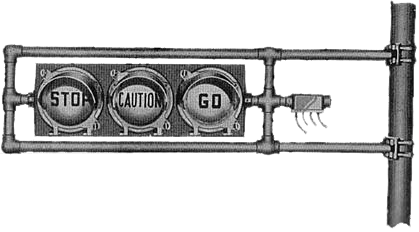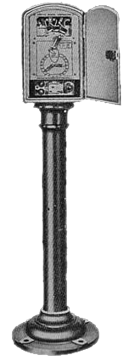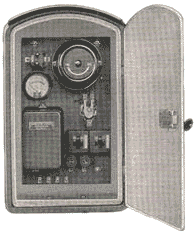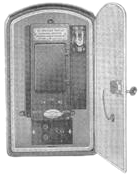Difference between revisions of "Harrington-Seaberg"
(Created page with "== Raw data accumulation == Source - Swedes in Moline, Illinois: 1847-2002 By Lilly Setterdahl (Media:SIMI-Pag30.jpg) 1921 - '''Harrington-Seaberg Machine & Electric Com...") |
(No difference)
|
Revision as of 15:51, 16 December 2013
Contents
Raw data accumulation
Source - Swedes in Moline, Illinois: 1847-2002 By Lilly Setterdahl (Media:SIMI-Pag30.jpg)
1921 - Harrington-Seaberg Machine & Electric Company was founded as a partnership by Fred Harrington and Severin Seaberg.
1922 - They received a contract for installing traffic signals in and around Chicago and another for Los Angeles.
1923 - They formed a corporation, the Harrington-Seaberg Fire Alarm Telegraph Co.. Later that year they changed the name once more to the Harrington Seaberg Corporation.
1925 - They take over the Magnetic Sign Flasher Company of Davenport
1926 - Axel Carlson listed as Vice President and Seaberg as president (what happened to Fred Harrington?)
1928 - They move to new building at 202 20th St. in Moline, IL, sales peak at $260,117.
1929 - Company sold to Gamewell Corp for $369,960 in shares and cash. (note the year - great move selling the company before the stock market crash, bad move accepting shares as partial payment?). Seaberg agreed to remain with the company as general manager. Shareholders at time of sale were:
- Severin Seaberg
- Carl Bergstedt
- Fred Harrington
- Carl Johnson
- George Strombeck
- James P. Pearson
- Carl Seaberg
- E.G. Swanson
The Gamewell Corp (of New York) was also the parent company for Eagle Signal Company.
1930 - Eagle Signals starts advertising that they are the exclusive distributor for Harrington-Seaberg signals.
As late as 1959 the Eagle Signal company resided at the old Harrington Seaberg building (202 20th St.).
As of 2002, there existed a Harrington Signal Company at 2519 4th Ave., Moline, IL - any relation?
Source - Siemens History
1987 Harrington-Seaberg was acquired by Mark IV industries
1988 became Automatic Signal/Eagle Signal, with the follow-on to become the venerable operation of Eagle Traffic Control Systems
Summary
Traffic Signals
broken down into general categories [delete]
Four Ways
Offered as a line of two, three, and four-way signals for spanwire suspension and post mounting.
Adjustables
H-S touted their one way line as being "Weatherproof, cast aluminum, and easy to install. Various types, vertical or horizontal, with two or three lights, are furnished."
KB6 - One-Way Traffic Signal
Figure: KB6 Post-mount signal. [Image by LC]
Figure: Horizontal pole-mount signal. [Image by LC]
Pedestrian Signals
describe models, variations [delete]
Vehicle Heads (Round)
Vehicle Heads (Square Door Adapters)
Pedestrian/Sign Heads (Rectangular)
Informational Signals and Signs
describe models, variations [delete] includes "box signs," "case signs," and Ped Heads with special [non-ped] lenses.
Lenses
describe models, variations [delete]
Vehicular
Pedestrian
Worded
Symbols
Special
Controllers
Co-Ordiplex Traffic Control System A name later adopted by Eagle for their line of controllers. Designed to have coordinated centralized control over the local controllers, hence the name, a master timer is in the main signal office or cabinet with local timers at each intersection connected via a 4-wire interface to the main timer to ensure they do not get out of synch. or quickly recorrect if they do.
Features of H-S controllers:
Sliding Scales or Percentages instead of Rigid Step adjustments Speed or Time gradients clearly marked on the controller Go indications are adjustable from 15% to 85% Amber interval is, by default, 2 to 10 seconds -Extended Amber available by special order Ability to manually control intersections seperate of the system Special control for Fire and Police emergencies
Installed in about 1925 in the Loop District of Chicago.
Induction Disc Drive Traffic Signal Controller
Can operate eight standard four-way signals equipped with 50W bulbs. Simply designed and uses no worm or belt-drive transmission.
Figure: Induction Controller Cabinet. Note time-adjusting levers and hand controls. [Image by LC]
EH1 Master Timer
Figure: EH1 Master Timer Cabinet. [Image by LC]
EK2 Local Timer
Figure: EK2 Local Timer Cabinet. [Image by LC]
Hardware
this would include any kind of mounting hardware including brackets, slipfitters, hangers, bases, etc. [delete]
Miscellaneous Images
some quality pictures (overruns) that didn't flow with the article preceding [delete]
References
Insert any sources cited or used here [delete]
